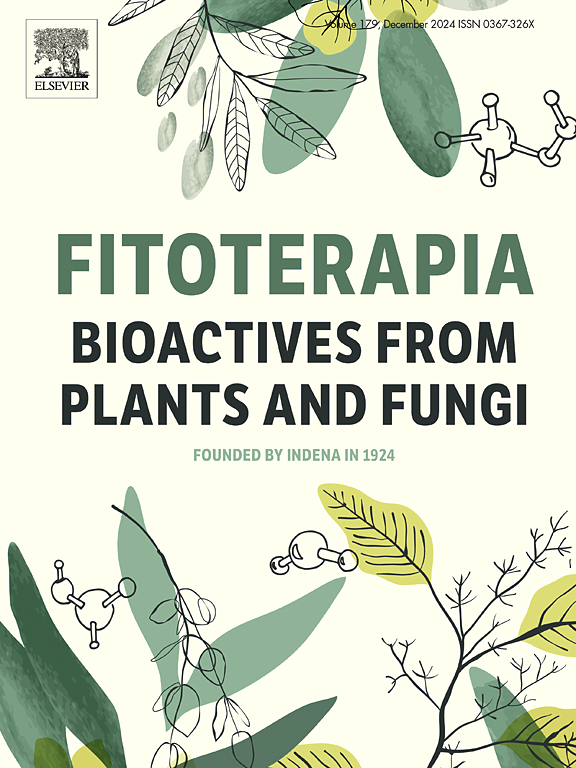The protective effect of Argan oil and its main constituents against xenobiotics-induced toxicities
IF 2.5
3区 医学
Q3 CHEMISTRY, MEDICINAL
引用次数: 0
Abstract
Background
Argan oil (AO) is a vegetable oil extracted from the fruits of Argania spinosa L. tree, belonging to the Sapotaceae family, primarily found in Morocco. Research studies have demonstrated that AO exhibits diverse pharmacological properties, including antioxidant, antimicrobial, anticancer, antiinflammatory, antidiabetic, antihypercholesterolemic, antiatherogenic, and immunomodulatory effects. These effects are attributed to its main constituents, including oleic acid, linoleic acid, γ-tocopherol, α-tocopherol, and ferulic acid.
Objective
This review aimed to present the protective role of AO and its main constituents against xenobiotics-induced toxicities.
Material and methods
Based on results from various in vitro and in vivo investigations published in the main scientific databases, the beneficial action of AO against xenobiotics-induced toxicities was analyzed.
Results
AO and its main constituents have reduced neurotoxicity, hepatotoxicity, nephrotoxicity, pneumotoxicity, thyroid toxicity, hematotoxicity, immunotoxicity, genotoxicity, and colon toxicity induced by different natural and chemical xenobiotics. Different mechanisms of action are involved in these effects, including enhancement of antioxidant defense, reduction of oxidative stress, modulation of inflammation, stimulation of fatty acid oxidation, suppression of apoptosis, regulation of miRNAs expression, elevation of acetylcholinesterase activity, activation of Krebs cycle enzymes, and restoration of mitochondrial function.
Conclusion
The study shows clearly the beneficial effect of Argan oil against xenobiotics-induced toxicities was analyzed. However, clinical trials are necessary to verify the protective effects of this oil in human intoxications caused by both natural and chemical xenobiotics.

摩洛哥坚果油及其主要成分对外源性毒性的保护作用。
背景:摩洛哥坚果油(AO)是一种从摩洛哥坚果科植物Argania spinosa L.树的果实中提取的植物油。研究表明,AO具有多种药理特性,包括抗氧化、抗菌、抗癌、抗炎、抗糖尿病、抗高胆固醇、抗动脉粥样硬化和免疫调节作用。其主要成分为油酸、亚油酸、γ-生育酚、α-生育酚和阿魏酸。目的:综述AO及其主要成分对外源性毒性的保护作用。材料和方法:根据主要科学数据库中发表的各种体外和体内研究结果,分析了AO对外源药物引起的毒性的有益作用。结果:AO及其主要成分可降低不同天然和化学外源物引起的神经毒性、肝毒性、肾毒性、肺毒性、甲状腺毒性、血液毒性、免疫毒性、遗传毒性和结肠毒性。这些作用涉及不同的作用机制,包括增强抗氧化防御、减少氧化应激、调节炎症、刺激脂肪酸氧化、抑制细胞凋亡、调节mirna表达、提高乙酰胆碱酯酶活性、激活克雷布斯循环酶和恢复线粒体功能。结论:本研究明确分析了摩洛哥坚果油对外源性毒性的有益作用。然而,临床试验是必要的,以验证这种油的保护作用,在人类中毒引起的天然和化学异种生物。
本文章由计算机程序翻译,如有差异,请以英文原文为准。
求助全文
约1分钟内获得全文
求助全文
来源期刊

Fitoterapia
医学-药学
CiteScore
5.80
自引率
2.90%
发文量
198
审稿时长
1.5 months
期刊介绍:
Fitoterapia is a Journal dedicated to medicinal plants and to bioactive natural products of plant origin. It publishes original contributions in seven major areas:
1. Characterization of active ingredients of medicinal plants
2. Development of standardization method for bioactive plant extracts and natural products
3. Identification of bioactivity in plant extracts
4. Identification of targets and mechanism of activity of plant extracts
5. Production and genomic characterization of medicinal plants biomass
6. Chemistry and biochemistry of bioactive natural products of plant origin
7. Critical reviews of the historical, clinical and legal status of medicinal plants, and accounts on topical issues.
 求助内容:
求助内容: 应助结果提醒方式:
应助结果提醒方式:


